Climate & Environment
 More snow is melting during winter across the West, a concerning trend that could impact everything from ski conditions to fire danger and agriculture, according to a new CU Boulder analysis of 40 years of data.
More snow is melting during winter across the West, a concerning trend that could impact everything from ski conditions to fire danger and agriculture, according to a new CU Boulder analysis of 40 years of data.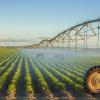 Irrigated agriculture is the planet's largest consumer of freshwater, producing more than 40% of food worldwide. Yet the exact amounts of water being used in irrigation remains largely unknown. Finding answers would provide insight into the global water balance.
Irrigated agriculture is the planet's largest consumer of freshwater, producing more than 40% of food worldwide. Yet the exact amounts of water being used in irrigation remains largely unknown. Finding answers would provide insight into the global water balance. Heat waves, which are projected to become more frequent and intense as the century progresses, could cause as much as 10 times more crop damage than is now projected, a team of researchers led by CU Boulder has found.
Heat waves, which are projected to become more frequent and intense as the century progresses, could cause as much as 10 times more crop damage than is now projected, a team of researchers led by CU Boulder has found.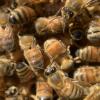 Think of it as a testament to a honeybee's love for its queen: Bees build what looks like a telecommunications network to pass messages, in the form of pheromones, from their queen to other members of a colony.
Think of it as a testament to a honeybee's love for its queen: Bees build what looks like a telecommunications network to pass messages, in the form of pheromones, from their queen to other members of a colony. Ecosystem services might be more vulnerable to extinction than previously thought, a new study finds.
Ecosystem services might be more vulnerable to extinction than previously thought, a new study finds.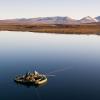 Recent analysis of ancient DNA gathered from lake beds in the Arctic may not only be a glimpse of the past but a snapshot of our potential future.
Recent analysis of ancient DNA gathered from lake beds in the Arctic may not only be a glimpse of the past but a snapshot of our potential future.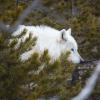 In November 2020, Colorado citizens narrowly passed a ballot initiative to reintroduce gray wolves to the state by the end of 2023. What could Proposition 114 could mean in the next few years for the state? We spoke with our own ecological expert to find out.
In November 2020, Colorado citizens narrowly passed a ballot initiative to reintroduce gray wolves to the state by the end of 2023. What could Proposition 114 could mean in the next few years for the state? We spoke with our own ecological expert to find out.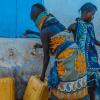 Anna Libey, a doctoral student in environmental engineering at CU Boulder, is the lead author on a new paper that compares utilities around the world and advocates for more subsidization in utility operations to provide clean water.
Anna Libey, a doctoral student in environmental engineering at CU Boulder, is the lead author on a new paper that compares utilities around the world and advocates for more subsidization in utility operations to provide clean water. Since the 1980s, Colorado's small mammals have made an ominous trek—climbing, on average, 400 feet uphill in elevation to escape from climate change.
Since the 1980s, Colorado's small mammals have made an ominous trek—climbing, on average, 400 feet uphill in elevation to escape from climate change.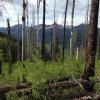 Bark beetle outbreaks and wildfire alone are not a death sentence for Colorado’s beloved forests—but when combined, their toll may become more permanent, new CU Boulder research shows.
Bark beetle outbreaks and wildfire alone are not a death sentence for Colorado’s beloved forests—but when combined, their toll may become more permanent, new CU Boulder research shows.


